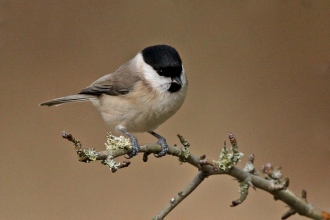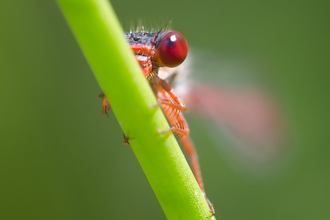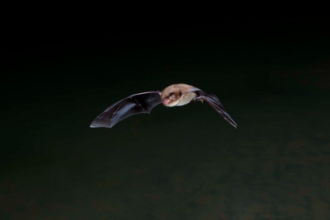Wild Beaver Appeal
Nature has been pushed to the brink, but wild beavers can help turn things around. Beavers are incredible ecosystem engineers. They create wetlands which benefit wildlife, absorb carbon dioxide, reduce flooding, and improve water quality. The only problem is, in the UK, they went extinct in the wild around 400 years ago.
In 2024, two wild beavers arrived at Helman Tor. Since then, they have been transforming the reserve - coppicing trees, building dams, and creating wetlands already thriving with new life.
And now, an important new chapter has begun. Cornwall Wildlife Trust has been granted a licence by Natural England, and we have successfully released additional wild beavers into our Helman Tor complex of nature reserves, strengthening the genetic diversity of the small population.
This is a major milestone - but the work does not stop here. Ensuring these animals thrive, and that people and beavers can live alongside one another, takes long-term care, monitoring, and support.
Your donation can help secure their future.
Your gift will help to:
- Carry out essential checks and welfare monitoring of released beavers
- Track how wetlands, wildlife and watercourses respond over time
- Work with landowners and local communities to support coexistence
- Continue the careful, science-led management needed to build a healthy, self-sustaining population
Beaver Appeal video 2025 (https://youtu.be/w-p2et70g5k)
Meet Sue, and her family of builders.
A story 400 years in the making...
Cornwall Wildlife Trust’s vision is to restore a self-sustaining and genetically diverse population of beavers in the Par and Fowey river catchments, centred on our nature reserves around Helman Tor. Now, our focus is on the long-term.
With your help, we can continue this work and give beavers the best possible chance to shape Cornwall’s rivers once again.
Become part of the wild beavers' story
Wild beavers are back in Cornwall, and their story is only just beginning.
By supporting the Wild Beaver Appeal, you are helping to create a Cornwall where wetlands teem with life, rivers run cleaner, and wildlife has space to recover. Your donation helps ensure that released beavers are carefully monitored, and that this remarkable return becomes a lasting success.
Any donations received in excess of the fundraising target will continue to be allocated to the Beaver Reintroduction Project, supporting the ongoing monitoring, management and conservation work needed to sustain wild beavers in Cornwall.
Gift aid on this appeal will go towards unrestricted funding to support our wider work.
Species helped by beavers
Just some of the species which evidence shows are supported by beaver-created wetlands:

Birds

Dragonflies and damselflies

Bats
Your questions answered
How much do you need to raise?
The project is a long-term commitment, with costs estimated at around £800,000 over ten years. Thanks to generous partners and supporters, we have already been able to reach key milestones, including the licensed release of wild beavers.
The Wild Beaver Appeal continues to raise vital funds to support the ongoing work that follows release — including field monitoring, habitat surveys, community engagement, and ensuring the health and welfare of the beavers and their wetlands.
Are beavers living in the wild anywhere else?
Beavers have been reintroduced into 27 European countries, and are becoming more widely spread in the UK. Beavers are now living wild in Devon and, to a much lesser extent, in Cornwall.
This includes a licensed population on the River Otter (in Devon), as well as a population on the Tamar River and its tributaries. Since 2024 we have had a pair of beavers in the Par catchment, around our Helman Tor complex of nature reserves, that were released by an unknown third party. A well-planned release of multiple animals is needed to sustain a genetically healthy population of beavers in Cornwall.
Are there risks with introducing beavers?
We believe that any risks associated with beavers are far outweighed by the benefits. We are confident that in Cornwall we will be able to demonstrate how beavers can work for everyone.
For example, beavers may sometimes build dams, dig burrows, and coppice trees where we don't want them to. We are working with local landowners in advance to plan for their arrival and are putting measures in place where needed.
Natural England has developed a detailed licensing regime and application process to make sure that stakeholders are engaged and landowners are supported. We have been developing our wild release licence for the past two years. When this licence is approved, the project will support landowners and communities through the transition to living alongside beavers.
Is the project area suitable?
We know that our project area is suitable for the reintroduction of beaver, with lots of vegetation, slow flowing water, and pools of water.
Why do beavers build dams?
Beavers live in freshwater habitats, like rivers and streams, and prefer areas surrounded by wetland plants, trees and woodland. They are rather slow on land but excellent swimmers, so they feel safest when they’re close to deep water (around 70cm deep). If the water isn’t deep enough for them, beavers can make it deeper. They use mud, wood, and stones to build dams across shallow rivers, streams and ditches. The dams are leaky and let some water through, but slow down the flow enough for ponds to form, where the beavers can live and feel secure.
What has research from other reintroductions shown?
There is evidence to show that beavers have….
- Led to an increase of three times the diversity of pond and water plants
- Increased frogspawn abundance by over 6000%
- Increased bird species and abundance up to 100m away from beaver sites
- Increased bat activity by almost 400%
- Increased moth species diversity by 24%
- Led to an increase in dragonfly species by seven times
Bringing beavers back: the story so far...
From partnerships to licence applications, every milestone has helped bring us closer to seeing wild beavers shaping our rivers and wetlands once more. Here's how the journey has unfolded so far...
- 2012: Cornwall Wildlife Trust's board agree to become involved in beaver reintroduction after a presentation by expert Derek Gow.
- 2014: Partnership agreed with Chris Jones at Woodland Valley Farm, working towards a fenced release.
- June 2017: A pair of European beavers are introduced to a five acre enclosure on Woodland Valley Farm, thanks to generous donations from the public raising over £20,000 in 59 days!
- April 2019: Two kits (juvenile beavers) are born at Woodland Valley Farm - the first beavers to be born in Cornwall for over 400 years!
- June 2022: The fifth anniversary of beavers at Woodland Valley Farm. Research shows the new beaver-created wetlands have led to significant improvements in biodiversity, including three additional species of mammal, 10 new bird species, 11 species of bat and 17 species of damselfly and dragonfly being recorded on the site.
- April 2023: Cornwall Wildlife Trust partners with St. Eval to appoint a Beaver Officer to work on the first ever licensed wild release of beavers in Cornwall.
- February 2024: Wild beavers are discovered at Cornwall Wildlife Trust's Helman Tor nature reserve, following an observation made by a member of the public.
- September 2024: Evidence of beaver dams and coppiced trees are seen at Helman Tor nature reserve. Cornwall Wildlife Trust's monitoring work reveals wildlife interacting with the beaver-created habitat and increased wetland areas.
- December 2024: Cornwall Wildlife Trust begin hosting public consultation events across the Par and Fowey catchment area with local stakeholders.
- February 2025: Cornwall Wildlife Trust welcomes the news that the UK Government is now accepting applications for licensed wild release of beavers in England.
- June 2025: Beaver Officer Lauren Jasper officially submits Cornwall Wildlife Trust's application for a wild beaver release licence.
- January 2026: Natural England approves the application and issues Cornwall Wildlife Trust's wild beaver release licence.
- February 2026: Cornwall Wildlife Trust carries out the first licensed release of wild beaver in Cornwall at their complex of nature reserves at Helman Tor.
